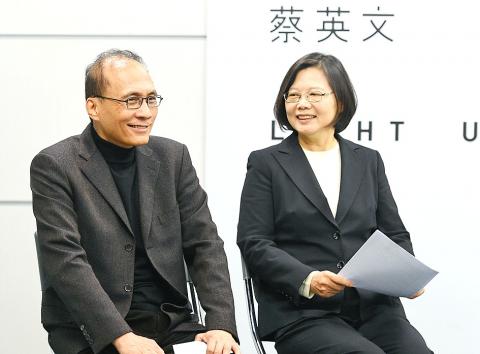Calling him “the best executive,” president-elect Tsai Ing-wen (蔡英文) yesterday named former minister of finance Lin Chuan (林全) as the premier of the Democratic Progressive Party (DPP) administration that is to take office on May 20.
Lin is good at communicating and solving problems, and is also adept at delineating the parameters of a disagreement so that a solution can be found, Tsai said.
Lin is the person most familiar with her plans for governing the nation, and his performance when he was a minister won the approval of the public, Tsai said.

Photo: Chang Chia-ming, Taipei Times
“That was why I chose him as premier,” Tsai said alongside Lin at a press conference held to announce his appointment.
Lin, born in Kaohsiung on Dec. 13, 1951, was chief of the Directorate-General of Budget, Accounting and Statistics of the Executive Yuan between 2000 and 2002, and minister of finance between late 2002 and early 2006 under then-president Chen Shui-bian (陳水扁). He has no party affiliation.
Lin is now the chief executive officer of the New Frontier Foundation, a think tank chaired by Tsai. He played a major role in her presidential campaign.
Although Lin worked exclusively on financial matters when in government, Tsai said: “I promise everyone that Lin Chuan’s Cabinet will not be one focused on economics and finance,” but one of reform, and one that is good at communicating and getting things done.
Tsai said she chose to announce the appointment yesterday because she plans to have the key positions in the new Cabinet selected by next month to give her team enough time to prepare for office.
The nation faces many long-standing problems and challenges, Tsai said, adding that the political and social reforms she pledged are as important to her as economic and industrial policies.
Starting straight away, her team aims to rebuild the public’s trust in the government, Tsai said.
“I believe Lin Chuan will be the best executive for Taiwan as it heads toward reform,” Tsai said.
At the news conference, Lin said he would aim for close communication with local governments and that he hoped to recruit talented officials from local government to help the Cabinet get a grasp of the needs and expectations of the public.
Saying that at first he did not want to return to public life, Lin called on people with experience to “help us in government,” adding that the government must nurture new talent to be sustainable.
Lin has a bachelor’s degree in economics from Fu Jen Catholic University and a master’s degree in public finance from National Chengchi University. He received his doctorate in economics from the University of Illinois, Urbana-Champaign.
He has also served as executive director of Tsai’s Thinking Taiwan Foundation and head of the Taipei City Government’s Department of Finance, and is now a part-time instructor at National Taiwan University’s department of economics.

DAREDEVIL: Honnold said it had always been a dream of his to climb Taipei 101, while a Netflix producer said the skyscraper was ‘a real icon of this country’ US climber Alex Honnold yesterday took on Taiwan’s tallest building, becoming the first person to scale Taipei 101 without a rope, harness or safety net. Hundreds of spectators gathered at the base of the 101-story skyscraper to watch Honnold, 40, embark on his daredevil feat, which was also broadcast live on Netflix. Dressed in a red T-shirt and yellow custom-made climbing shoes, Honnold swiftly moved up the southeast face of the glass and steel building. At one point, he stepped onto a platform midway up to wave down at fans and onlookers who were taking photos. People watching from inside

A Vietnamese migrant worker yesterday won NT$12 million (US$379,627) on a Lunar New Year scratch card in Kaohsiung as part of Taiwan Lottery Co’s (台灣彩券) “NT$12 Million Grand Fortune” (1200萬大吉利) game. The man was the first top-prize winner of the new game launched on Jan. 6 to mark the Lunar New Year. Three Vietnamese migrant workers visited a Taiwan Lottery shop on Xinyue Street in Kaohsiung’s Gangshan District (崗山), a store representative said. The player bought multiple tickets and, after winning nothing, held the final lottery ticket in one hand and rubbed the store’s statue of the Maitreya Buddha’s belly with the other,

‘NATO-PLUS’: ‘Our strategic partners in the Indo-Pacific are facing increasing aggression by the Chinese Communist Party,’ US Representative Rob Wittman said The US House of Representatives on Monday released its version of the Consolidated Appropriations Act, which includes US$1.15 billion to support security cooperation with Taiwan. The omnibus act, covering US$1.2 trillion of spending, allocates US$1 billion for the Taiwan Security Cooperation Initiative, as well as US$150 million for the replacement of defense articles and reimbursement of defense services provided to Taiwan. The fund allocations were based on the US National Defense Authorization Act for fiscal 2026 that was passed by the US Congress last month and authorized up to US$1 billion to the US Defense Security Cooperation Agency in support of the

HIGH-TECH DEAL: Chipmakers that expand in the US would be able to import up to 2.5 times their new capacity with no extra tariffs during an approved construction period Taiwan aims to build a “democratic” high-tech supply chain with the US and form a strategic artificial intelligence (AI) partnership under the new tariffs deal it sealed with Washington last week, Taipei’s top negotiator in the talks said yesterday. US President Donald Trump has pushed Taiwan, a major producer of semiconductors which runs a large trade surplus with the US, to invest more in the US, specifically in chips that power AI. Under the terms of the long-negotiated deal, chipmakers such as Taiwan Semiconductor Manufacturing Co (TSMC, 台積電) that expand US production would incur a lower tariff on semiconductors or related manufacturing